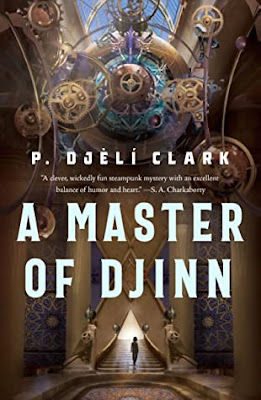Great stuff! Interesting, surprisingly deep, and above all: fun!
This novel (Clark's first full novel) is set in the same universe as several short stories and at least one novella (The Haunting of Tram Car 015). In an alternate history of the early 20th century, djinn and other magical creatures have come into our world from elsewhere, centered on Cairo.
We meet Fatma, an agent for the Ministry of Alchemy, Enchantments, and Supernatural Entities. We also meet her girlfriend, the mysterious Siti, and her new partner from the Ministry, Hadia. There are murders that may be related to the alleged return of al-Jahiz, the very sorcerer who broke the barrier between worlds several decades before. But is he really al-Jahiz returned? Who killed all those people? What do all the various djinn inhabitants of Cairo have to do with all this? And why are the beings alleged to be angels involved?
We do get some answers to these and other questions, but there are enough mysteries for the next one. All in all, the novel is just a fun read. People who really like mysteries may guess who did it too early, but I'm not much of a mystery reader. I was just along for the ride, and I enjoyed every bit of it.
Djinn are such a cool fantasy idea! See also S. A. Chakraborty's Daevabad trilogy, and of course a couple thousand years of folklore. While Clark's world building is more sparse than Chakraborty's (there's no glossary, but I could have used one, or at least a dramatis personae), Clark is of the "doing more with less" or "show don't tell (much)" school of world building. We never really figure out exactly how it all happened or what it all means, although to be fair some of that happens in the other stories. But I think he gives enough hints that a careful reader can fill in some of the details.
The "surprisingly deep" part I mentioned earlier: I was having so much fun the first half or so of the novel that I was starting to wonder if this was one of those "fun but not very deep" novels. Not that there's anything wrong with that! But I usually like a little more to chew on in my fiction.
It may be hard to notice among all the fun, but there is a sophisticated exploration of power and the drive to dominate versus the drive to cooperate throughout the novel. European colonialism of Egypt has been ended in this alternate history. But there are reactionaries (of course!) who want to bring back the good old days, complete with a hefty dose of Orientalism (in the Edward Said sense). Some of these reactionaries are victims themselves of other power dynamics, but so are most of the other characters of the novel.
Yet the choice remains: is the best remedy for oppression to seek to dominate others? Or is there another, more open, more egalitarian path of love? This second path can be more difficult. Maybe it's never really been tried in history (at least in our history!). But both here and in last year's excellent novella Ring Shout, Clark shows us that this other path could also be a lot of fun.
PS: This one is rightfully nominated for the Hugo this year. It's only the second nominee I've read so far, but I'd say between this and Arkady Martine's novel, we're in for a good year for Hugo novels.

No comments:
Post a Comment